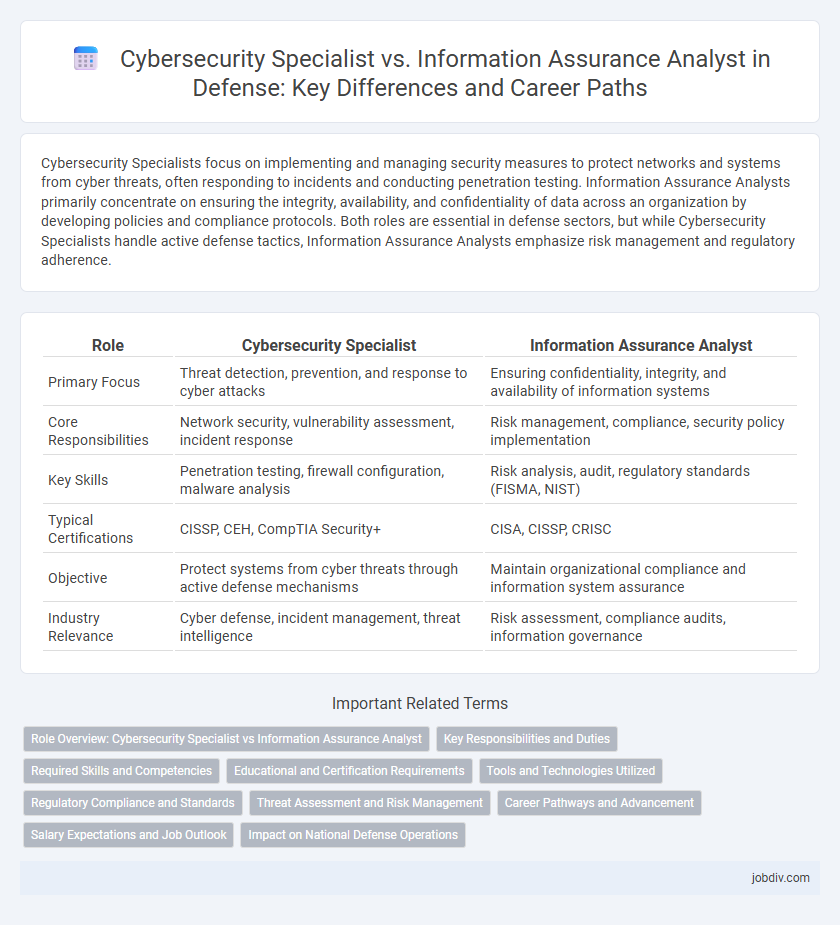Cybersecurity Specialists focus on implementing and managing security measures to protect networks and systems from cyber threats, often responding to incidents and conducting penetration testing. Information Assurance Analysts primarily concentrate on ensuring the integrity, availability, and confidentiality of data across an organization by developing policies and compliance protocols. Both roles are essential in defense sectors, but while Cybersecurity Specialists handle active defense tactics, Information Assurance Analysts emphasize risk management and regulatory adherence.
Table of Comparison
| Role | Cybersecurity Specialist | Information Assurance Analyst |
|---|---|---|
| Primary Focus | Threat detection, prevention, and response to cyber attacks | Ensuring confidentiality, integrity, and availability of information systems |
| Core Responsibilities | Network security, vulnerability assessment, incident response | Risk management, compliance, security policy implementation |
| Key Skills | Penetration testing, firewall configuration, malware analysis | Risk analysis, audit, regulatory standards (FISMA, NIST) |
| Typical Certifications | CISSP, CEH, CompTIA Security+ | CISA, CISSP, CRISC |
| Objective | Protect systems from cyber threats through active defense mechanisms | Maintain organizational compliance and information system assurance |
| Industry Relevance | Cyber defense, incident management, threat intelligence | Risk assessment, compliance audits, information governance |
Role Overview: Cybersecurity Specialist vs Information Assurance Analyst
Cybersecurity Specialists focus on protecting military networks and systems from cyber threats through continuous monitoring, threat detection, and incident response. Information Assurance Analysts prioritize safeguarding data integrity, confidentiality, and availability by implementing security policies, conducting risk assessments, and ensuring compliance with defense regulations. Both roles are critical in maintaining operational security within defense infrastructures but differ in their approach to threat mitigation and information protection.
Key Responsibilities and Duties
Cybersecurity Specialists primarily focus on protecting defense networks by identifying vulnerabilities, implementing security measures, and responding to cyber threats in real-time to maintain system integrity. Information Assurance Analysts concentrate on ensuring the confidentiality, integrity, and availability of sensitive defense information through risk assessments, policy development, and compliance with federal security standards like NIST and DoD regulations. Both roles require expertise in threat analysis and incident response, but Cybersecurity Specialists emphasize hands-on threat mitigation while Information Assurance Analysts prioritize strategic planning and regulatory adherence.
Required Skills and Competencies
Cybersecurity Specialists require expertise in threat detection, intrusion prevention, and incident response, with strong skills in network security protocols, encryption methods, and vulnerability assessment. Information Assurance Analysts focus on risk management, compliance frameworks such as NIST and ISO 27001, and data integrity, necessitating proficiency in auditing, policy enforcement, and disaster recovery planning. Both roles demand analytical thinking, attention to detail, and up-to-date knowledge of evolving cyber threats and defense technologies.
Educational and Certification Requirements
Cybersecurity Specialists typically require a bachelor's degree in computer science, information technology, or a related field, along with certifications such as Certified Information Systems Security Professional (CISSP) or Certified Ethical Hacker (CEH). Information Assurance Analysts often hold degrees in information assurance, cybersecurity, or management information systems, complemented by certifications like Certified Information Systems Auditor (CISA) or CompTIA Security+. Both roles demand strong technical knowledge and continuous education to address evolving cyber threats in defense sectors.
Tools and Technologies Utilized
Cybersecurity Specialists leverage advanced intrusion detection systems (IDS), firewalls, and endpoint protection platforms to combat evolving cyber threats, utilizing tools such as Splunk, Wireshark, and Metasploit for threat analysis and penetration testing. Information Assurance Analysts focus on risk management frameworks like NIST and ISO 27001, employing vulnerability assessment tools including Nessus and Qualys to ensure compliance and secure information systems. Both roles integrate Security Information and Event Management (SIEM) systems to monitor and respond to security incidents in defense environments.
Regulatory Compliance and Standards
Cybersecurity Specialists prioritize implementing security measures aligned with regulations such as NIST SP 800-53 and the Cybersecurity Maturity Model Certification (CMMC) to protect defense systems from cyber threats. Information Assurance Analysts concentrate on ensuring that organizational policies comply with standards like FISMA and DoD Directive 8500.01 by continuously assessing and validating controls across the information lifecycle in defense environments. Both roles are critical in maintaining government-mandated cybersecurity frameworks and safeguarding national security data.
Threat Assessment and Risk Management
Cybersecurity Specialists specialize in identifying, analyzing, and mitigating emerging cyber threats using advanced threat intelligence tools and real-time monitoring systems. Information Assurance Analysts focus on developing and implementing comprehensive risk management frameworks aligned with defense compliance standards to protect information assets. Both roles are crucial for maintaining national security, with specialists emphasizing proactive threat detection and analysts concentrating on strategic risk assessment and policy enforcement.
Career Pathways and Advancement
Cybersecurity Specialists typically advance by gaining expertise in network security, ethical hacking, and threat detection, often progressing to roles such as Security Architect or Chief Information Security Officer (CISO). Information Assurance Analysts focus on risk management, compliance, and policy development, with career growth leading to positions like Risk Manager or Director of Information Assurance. Both pathways benefit from certifications like CISSP, CISM, and CISA, which enhance opportunities for higher-level security and defense roles.
Salary Expectations and Job Outlook
Cybersecurity Specialists earn an average salary of $103,000 annually, with demand driven by the increasing complexity of cyber threats in defense sectors. Information Assurance Analysts typically receive salaries around $95,000 per year, focusing on safeguarding military data integrity and compliance with federal regulations. Job growth for Cybersecurity Specialists is projected at 33% through 2031, outpacing the 19% growth expected for Information Assurance Analysts due to expanding cyber defense requirements.
Impact on National Defense Operations
Cybersecurity Specialists protect national defense operations by implementing advanced threat detection and response protocols that safeguard critical military infrastructure from cyberattacks. Information Assurance Analysts focus on maintaining the integrity, availability, and confidentiality of defense information systems through continuous risk assessment and compliance with security policies. Both roles are crucial for mitigating cyber threats that can disrupt command and control systems, ensuring uninterrupted mission readiness and operational effectiveness.
Cybersecurity Specialist vs Information Assurance Analyst Infographic

 jobdiv.com
jobdiv.com